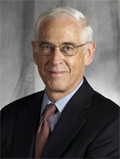Shabbos
On Saturday I noticed the upside-down talis of the visitor seated in front of me. After helping with the talis, I welcomed him and asked where he was from. He replied "Cincinnati but now Houston." He was playing hooky from a convention and couldn't resist davening at Touro. So, says I, "Do you know my friend who lives in Houston, Dr Arthur Forman? Arthur was my college roommate and is a recently retired neurologist from MD Anderson Cancer Center. Houston has one million people, so I was not expecting a positive response. The visitor said Arthur was one of "our" best clinicians and very empathetic to the patients.
I didn't know this was a royal "we" until Rabbi Marc Mandel introduced Dr John Mendelsohn, a past president of MD Anderson Cancer Center. He oversaw the hospital grow from a major cancer research center to a major treatment center and, at the tender age of 79, is still very involved in medical affairs. Rabbi Mandel asked him if intended to slow down. Dr. Mendelsohn replied that this had not occurred to him. He was in Newport to get an award.
Dr. Mendelsohn spent 15 years at the university of San Diego, 10 years at the Memorial Sloan Kettering Cancer Center, and found time to help develop an anti-cancer drug, antibody 225, also called Cetuximab, or Erbitux, against the receptor for epidermal growth factor which is used to treat colon cancer and head and neck cancer. Rabbi Mandel offered to explain this during a future sermon, but I think he should stick to simple topics like Talmud, Torah, and is there a minyan in sight.
The parsha today was B'midbar, in the desert. The rabbi posed the question, "What is the connection between the parsha and Shavuot." The connection was that the Torah was given in the desert, and on Shavuot we celebrate the giving of the Torah. But why in the desert? Captain Goldman though that there are fewer distractions in the desert, making it easier to focus. Rabbi Mandel explained that the desert did not belong to anyone. By giving the Torah there it was clear that the Torah did not belong to any one person or group of people, but each and every member of Klal Yisrael.
As Dr Mendelsohn slipped out the door to get back to work, he commented on the friendliness of the congregation.
Sunday the first day of Shavuot
Rabbi Mandel asked, "Why does the Torah portion include the 10 commandants…when there are many portions of the Torah that could have been cited?" The Rabbis were concerned that people might think that the ten commandants were the whole Torah. We know that Torah includes all the commandments, and, indeed, the whole corpus of interpretation. Rashi addressed this by saying that the ten commandments include all the commandments….
So why two tablets and not one? There are many answers, which lead to the conclusion that nobody knows. Perhaps it is to help us remember. By reading across the side by side tablets, the number of commandments is reduced to five. For example, number 4, "Observe the Sabbath," is connected with number 9, "Don't bear false witness." By observing Shabbos we are testifying to our belief in creation, which included a day of rest. Reading across the firsts and sixth, we have "I am the Lord, your G-d," and "You shall not murder." The connection: man is made in the image of G-d and our reverence for the ubershter extends to our fellow human beings.
At the dairy lunch, ably and deliciously prepared by Jackie Mandel, summer visitor Susan Gelbart
spoke about being a docent at The American Museum of Natural History in New York. The museum is fairly laid-back but there is one unbreakable rule: "Do not touch a child!" But sometimes situations arise. During a talk about ostriches Susan held up an ostrich egg. A rambunctious lad jumped up and, with his fist, smashed it to smithereens. Susan managed to maintain a calm, smiling demeanor. Would you?
Monday, the second day of Shavuot
On Monday we observed the second day of Shavuot including yizkor. The rabbi commented on the mass murder in Florida. Although we don't know how to prevent these incidents now, he felt eventually we will. He observed that this is not the Jewish way, which encourages us to observe Torah and the laws of civil society. Our departed ones had to deal with challenges just as we do. He mentioned World War I and World War II and the disastrous consequences of the breakdown of civil society. This was in our mind as we recited the twenty-third psalm, "Yea, though I walk through the valley of the shadow of death, I will fear no evil, for Thou art with me." To make this true, we need to be with G-d, and walk in his ways.

No comments:
Post a Comment